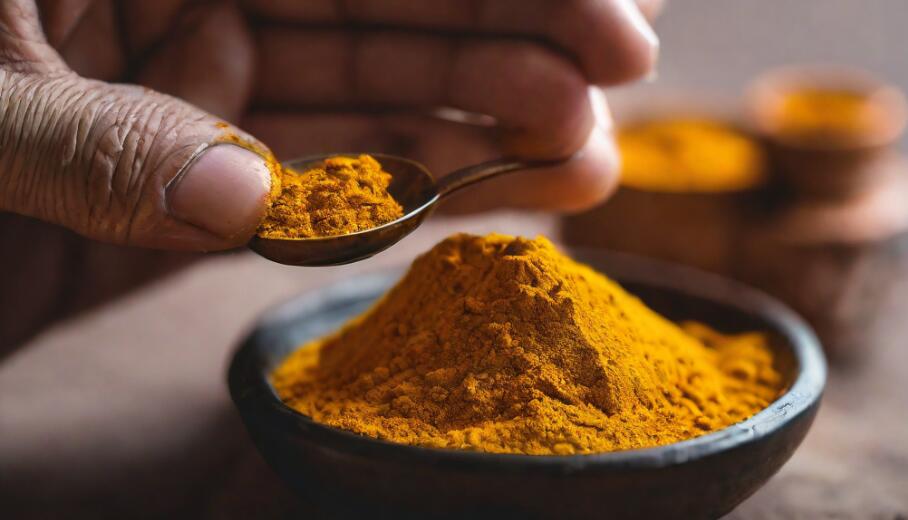Are you wondering how much turmeric is safe to consume each day? Turmeric, a golden spice renowned for its medicinal properties, is often touted as a natural remedy. Our guide will walk you through the optimal dosages and safety precautions to unlock its benefits without risk.
Key Takeaways
- Turmeric helps with swelling and has antioxidants, but taking more than 1,000 to 2,000 milligrams a day can be too much.
- People who use blood thinners or have gallbladder problems should talk to a doctor before they take turmeric.
- Taking high amounts of turmeric might cause stomach issues or affect how some medicines work.
- Look for turmeric supplements that don’t have extra stuff added and choose ones that are easy for your body to use.
- Always follow the instructions on how much turmeric to take and ask a healthcare person if it’s okay for you.

Health Benefits of Turmeric
Turmeric is a spice that has been used for centuries in traditional medicine and cooking. It is derived from the root of the Curcuma longa plant and is known for its vibrant yellow color. In recent years, turmeric has gained popularity for its potential health benefits. Let’s explore some of the key health benefits of turmeric.
1. Anti-Inflammatory Properties
One of the main active compounds in turmeric is curcumin, which has powerful anti-inflammatory effects. Chronic inflammation is linked to various health conditions such as heart disease, cancer, and arthritis. Consuming turmeric regularly may help reduce inflammation in the body and lower the risk of chronic diseases.
2. Antioxidant Activity
Turmeric is rich in antioxidants, which help protect the body against damage caused by free radicals. Free radicals are unstable molecules that can cause oxidative stress and contribute to the development of chronic diseases. The antioxidants in turmeric help neutralize these harmful molecules and promote overall health.
3. Improved Brain Function
Curcumin may have beneficial effects on brain health. It has been shown to cross the blood-brain barrier and has anti-inflammatory and antioxidant properties that may help protect against neurodegenerative diseases like Alzheimer’s. Some studies suggest that curcumin may even enhance memory and cognitive function.
4. Heart Health
Turmeric may have positive effects on heart health. It may help improve the function of the endothelium, which is the lining of blood vessels.
By enhancing endothelial function, turmeric may promote healthy blood flow and reduce the risk of heart disease. Additionally, curcumin has been shown to have anti-platelet and anti-clotting properties, which can help prevent blood clots.
5. Pain Relief
Turmeric has been used in traditional medicine as a natural remedy for pain relief. Its anti-inflammatory properties may help alleviate pain associated with conditions like arthritis and joint inflammation.
6. Digestive Health
Turmeric has been traditionally used to support digestion. It stimulates the production of bile, which aids in the breakdown and absorption of fats. Turmeric may also help reduce symptoms of indigestion, such as bloating and gas.
7. Potential Cancer Prevention
While more research is needed, some studies suggest that turmeric may have anti-cancer properties. Curcumin has been shown to inhibit the growth of cancer cells, reduce the spread of tumors, and induce cell death in certain types of cancer. However, it’s important to note that turmeric should not be used as a substitute for conventional cancer treatment.
It’s important to remember that while turmeric has numerous potential health benefits, it is not a miracle cure. The bioavailability of curcumin is low, meaning that the body absorbs it poorly.
How Much Turmeric Should You Take Daily?
The appropriate daily intake of turmeric can vary depending on the individual and the form in which it’s consumed, whether as a spice in cooking, a supplement, or an extract. In its dietary form, turmeric is considered safe to consume, and there is no specific recommended daily allowance. However, as a supplement, guidelines can be quite different.
For General Health Benefits
When used as a spice in cooking, people may consume anywhere from a fraction of a gram up to a few grams per day. This is considered safe and can contribute to the potential health benefits discussed earlier.
As a Supplement
For curcumin, the active ingredient in turmeric, studies have typically used doses ranging from 500 to 2,000 milligrams per day. Most supplements contain between 100 and 500 milligrams per capsule. It’s often recommended to take curcumin with black pepper (piperine) to enhance absorption.
It’s important to note that high doses of turmeric or curcumin supplements can lead to side effects such as digestive upset, and it’s not recommended to take high doses for extended periods without medical supervision.
For Specific Health Conditions
Here are some general guidelines that have been used in research for specific conditions:
- For osteoarthritis: 500 milligrams of curcumin extract taken two to four times daily for 4-12 weeks.
- For high cholesterol: 700 milligrams of turmeric extract taken twice daily for 3 months.
- For itching (pruritus): 1,500 milligrams of turmeric in three divided doses for 8 weeks.
Potential long-term effects of high doses
High doses of turmeric may lead to potential long-term effects. Excessive intake could cause gastrointestinal issues like indigestion and acid reflux. Moreover, high doses might also interfere with certain medications, impacting their effectiveness or causing adverse reactions.
It’s essential to be cautious about exceeding the recommended dosage to avoid these potential long-term effects. Taking too much turmeric can result in digestive problems and interaction with medications, making it crucial to stay within the recommended dosage.
Possible interactions with medications
Turmeric may interact with certain medications, including blood thinners like warfarin and aspirin, increasing the risk of bleeding. It can also interfere with drugs for acid reflux, diabetes, and anti-inflammatory medications.
The combination of turmeric with these medications could lead to adverse effects or reduce their effectiveness.
It’s important to talk to a healthcare provider before taking turmeric supplements if you’re on any medication to avoid potential interactions. Always disclose all the medications you are taking so your doctor can guide whether it is safe for you to use turmeric.
Health conditions that may be affected by turmeric
Some health conditions can be affected by turmeric. These include gallbladder problems, as turmeric may worsen these issues. People with bleeding disorders or those scheduled for surgery should use turmeric cautiously due to its blood-thinning effects.
Additionally, individuals with diabetes or hormone-sensitive conditions should monitor their intake of turmeric as it could affect blood sugar levels and hormone function.
Turmeric potentially interacts with certain medications used to slow blood clotting. So those taking such medications should consult a healthcare professional before using turmeric supplements.

How to recognize and manage side effects
When taking turmeric, it’s important to be aware of potential side effects such as stomach upset, nausea, dizziness, or diarrhea. If you experience any of these symptoms after consuming turmeric, consider reducing your intake or discontinuing use.
Additionally, if you’re on medication or have a medical condition, consult your healthcare provider before starting turmeric supplements to avoid adverse interactions.
To manage potential side effects of turmeric consumption, start with the lowest effective dose and gradually increase as tolerated. Monitoring your body’s response is crucial in recognizing and addressing any adverse reactions promptly.
When to consult a healthcare provider?
If you experience persistent nausea, diarrhea, or stomach upset after taking turmeric supplements, consult a healthcare provider. Likewise, if you are planning surgery or have bleeding disorders, seek medical advice before using turmeric due to its potential blood-thinning effects.
It is important to inform your healthcare provider about any existing health conditions and medications to avoid possible interactions with turmeric.
Choosing and Taking Turmeric Supplements
When selecting a turmeric supplement, it’s essential to consider factors such as its purity, potency, and bioavailability. Additionally, following recommendations for dosage and timing can help maximize the benefits of taking turmeric supplements.
Factors to consider when selecting a supplement
When selecting a turmeric supplement, consider the curcumin content, as it is the active ingredient responsible for many of turmeric’s benefits. Look for products with high bioavailability to ensure efficient absorption in the body.
Additionally, opt for supplements free from artificial additives and fillers to minimize potential side effects.
To further enhance potency, select supplements that contain black pepper extract (piperine) or phospholipids to boost curcumin absorption. It’s also important to choose reputable brands known for quality and purity.
Recommendations for dosage and timing
When considering turmeric supplements, it’s advisable to follow the recommended dosage on the product label or as directed by a healthcare professional. The typical dosage for turmeric supplements containing curcumin is 500-2,000 mg daily, taken with meals to enhance absorption.
For optimal results, consider taking turmeric with black pepper, which can increase the absorption of curcumin in the body. It’s important to consult a healthcare provider before starting any new supplement regimen to ensure safety and effectiveness.
Choose your turmeric supplement wisely based on factors such as quality, purity, and certifications like GMP or NSF. Additionally, consider taking your turmeric supplement at consistent times each day to establish a routine and maximize its potential benefits without exceeding the recommended daily amount.
How to Add Turmeric to Your Diet Safely?
Adding turmeric to your diet is a simple and delicious way to incorporate its health benefits into your daily routine. Here are some easy ways to add turmeric to your meals:
1. Golden Milk or Turmeric Tea
Create a comforting and soothing beverage by making golden milk or turmeric tea. Simply heat milk (dairy or plant-based) with a teaspoon of turmeric powder, a pinch of black pepper, and a sweetener of your choice. You can also add other spices like cinnamon or ginger for extra flavor.
2. Smoothies
Boost the nutritional value of your smoothies by adding a teaspoon of turmeric powder. It pairs well with fruits like mango, pineapple, or banana. You can also add a pinch of black pepper and a dash of coconut oil to enhance absorption.
3. Curry Dishes
Turmeric is a key ingredient in many curry recipes. Use it in your homemade curries by adding a teaspoon or two of turmeric powder to the spice blend. It will add flavor, color, and all the health benefits.
4. Roasted Vegetables
Sprinkle turmeric powder on roasted vegetables like cauliflower, sweet potatoes, or Brussels sprouts before baking. It adds a vibrant color and a mild earthy flavor.
5. Salad Dressings
Create a homemade salad dressing using turmeric. Combine turmeric powder, olive oil, lemon juice, honey, and a pinch of salt and pepper. Drizzle it over your favorite salads for a unique twist.
6. Rice or Grain Dishes
Add turmeric to your rice or grain dishes while cooking. It will infuse them with a beautiful yellow color and a subtle flavor. You can also mix turmeric with other spices like cumin, coriander, or paprika for a flavorful rice pilaf.
7. Scrambled Eggs or Tofu
Sprinkle turmeric powder on scrambled eggs or tofu for a vibrant and nutritious breakfast. It adds a depth of flavor and a warm hue to your dish.
8. Soups and Stews
Enhance the flavor and nutritional value of your soups and stews by adding turmeric. It pairs well with lentils, beans, or vegetables. Just add a teaspoon of turmeric powder to your recipe and let it simmer.
Remember, turmeric has a strong color and can stain surfaces and clothes. Be cautious when handling it and clean any spills promptly. Start with small amounts and gradually increase as you become accustomed to the flavor. Enjoy experimenting with different recipes and finding new ways to incorporate turmeric into your diet.
Conclusion
In conclusion, understanding the right amount of turmeric to take daily is essential for reaping its benefits. Remember to consult a healthcare provider before starting any new supplement regimen, especially if you have existing health conditions or are taking medications.






